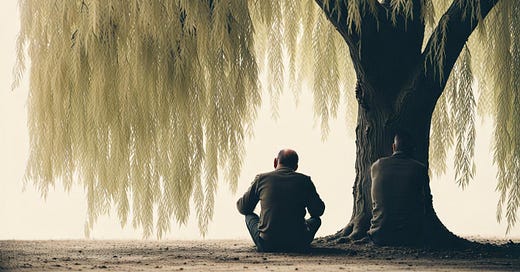Our Appetite for Poetic Misery: What Our Love of Sad Poems Says About Us
We spend our lives avoiding grief and heartbreak, yet we actively seek it out on the page. Are we all just masochists?
Consider the poetry canon. What are the first poems that leap to mind? Eliot's The Waste Land, a portrait of a broken, sterile world. Plath’s "Daddy," sizzling with rage and grief. Auden’s "Funeral Blues," demanding we "stop all the clocks." It’s a real downer of a playlist.
We live in a culture obsessed with the pursuit of happiness. We buy self-help books, we practice gratitude, we post smiling pictures of our brunch. Yet, when we turn to poetry, we seem to crave a dose of high-grade, beautifully crafted despair. We curl up with poems about death, loss, and disaster, and we call it a good time.
This paradox isn't as strange as it seems. Our appetite for poetic misery doesn't mean we're morbid freaks. It reveals something profound and, dare I say, healthy about the human psyche.
First, there is Catharsis. Aristotle was onto something. Reading a poem about a powerful, difficult emotion is like a controlled burn. It allows us to experience the feeling in a safe, aesthetic container. We get to touch the electric fence of grief without being fatally electrocuted. It's an emotional cleansing, leaving us feeling not sadder, but strangely lighter.
Second, and perhaps most importantly, there is Validation. The most terrifying part of suffering is the feeling that you are utterly alone in it. A sad poem acts as a flare in the dark. It says, "Someone else has been here. Someone else has felt this precise shade of ache. You are not a freak; you are human." It transforms a private, isolating pain into a shared, universal experience. This is an act of profound connection.
Finally, sad poems have Gravity. Let’s be honest, a lot of happy poetry can feel a bit... lightweight. It's lovely, like a helium balloon, but it can float away. A poem about mortality, injustice, or heartbreak has the density of a small planet. It deals with the Big Questions, the non-negotiable terms of our existence. It forces us to confront the difficult truths we spend most of our days distracting ourselves from.
This doesn't mean we should dismiss poems of joy. A great poem about happiness is a rare and difficult miracle. But our attraction to the melancholic isn't a flaw. It’s a sign that we are not seeking mere distraction from our art; we are seeking depth. It's a testament to our resilience. We are strong enough to look at the darkness and not flinch, but to find the beauty and truth shimmering within it.
Our love of sad poetry is, ultimately, how we practice being human.
What is your favorite "devastatingly beautiful" poem? The one that breaks your heart in the best possible way? Share it in the comments below.






On Thought In Harness by Edna St Vincent Millay